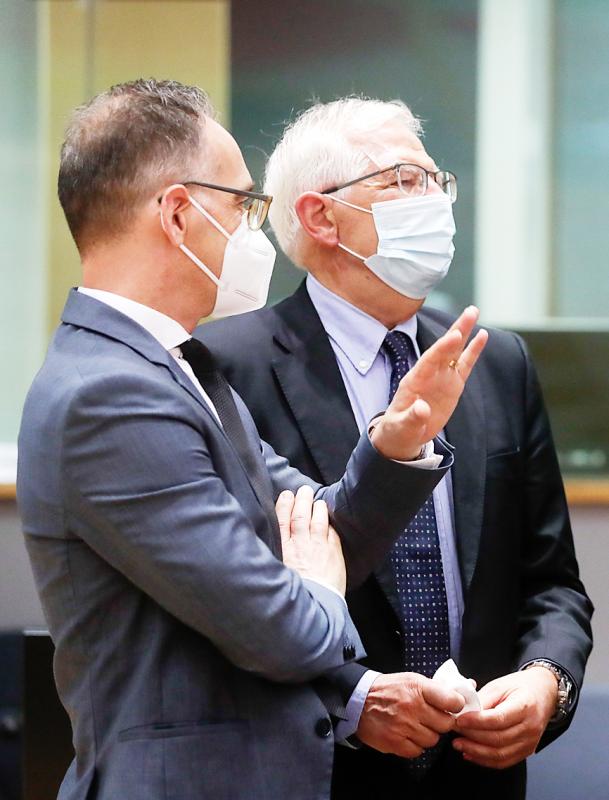Germany’s foreign minister on Tuesday accused China of tying the delivery of COVID-19 vaccines to political demands.
German Minister of Foreign Affairs Heiko Maas said that China and Russia had been good at publicly promoting the delivery of their vaccines to other countries, but also pursued other aims in doing so.
“We note, in particular with China, that the supply of vaccines was also used to make very clear political demands of various countries,” he said.

Photo: EPA-EFE
Speaking to reporters during a trip to Kalamazoo, Michigan, where Maas visited a Pfizer Inc production facility, he added that such behavior should be rejected.
“In order to prevent this from happening in the first place we don’t just have to criticize it, but we have to ensure that the affected countries have alternatives,” he said.
“Those alternative are the vaccines we have available, and which we, of course, want to make available to as many countries and regions in the world as possible,” Maas said. “[That way] the Russians and the Chinese can’t continue to conduct their difficult vaccine diplomacy in this fashion, which only has the purpose of increasing their own influence and not necessarily to save people’s lives in the first instance.”
While he did not provide any specific examples, Taiwan has accused China of using the delivery of its shots to pressure countries into dropping their support for Taiwan.
Chinese officials have claimed that their country is providing COVID-19 vaccines to nearly 40 African countries, but said that this was being done for purely altruistic reasons.
Last month, diplomats in Geneva, Switzerland, said that China had pressured Ukraine into withdrawing its support for a call for more scrutiny of human rights in Xinjiang, China, by threatening to withhold Chinese-made vaccine doses.
In response to Maas’ comments, Democratic Progressive Party spokesman Chou Chiang-chieh (周江杰) said that the party has consistently asserted that “vaccines should not be used as a political tool by any country.”
“As Taiwan confronts the difficult situation of vaccines and diplomacy, people should understand that China and its co-conspirators in the country are using the vaccine issue to create chaos and achieve their political aims,” he said.
The people and the government of Taiwan remain committed to overcoming obstacles in vaccine procurement, he said, adding that public-private cooperation has led to progress toward that goal.
The party categorically denies allegations that the government has in any way impeded private initiatives to buy vaccines, he added.
“Remarks to the effect that the government is blocking vaccine imports or that a shortage of doses is due to the government not doing enough are absurd — and they should stop,” he said.
Chou also slammed Chinese Nationalist Party (KMT) Chairman Johnny Chiang (江啟臣), who reportedly gave Premier Su Tseng-chang (蘇貞昌) a basket of flowers with a message full of Chinese proverbs.
“Chiang made a joke of himself by misusing proverbs, but, understandably, the party chairperson elections are making him nervous,” Chou said.
Additional reporting by Jonathan Chin and CNA

A magnitude 5.6 earthquake struck off the coast of Yilan County at 12:37pm today, with clear shaking felt across much of northern Taiwan. There were no immediate reports of damage. The epicenter of the quake was 16.9km east-southeast of Yilan County Hall offshore at a depth of 66.8km, Central Weather Administration (CWA) data showed. The maximum intensity registered at a 4 in Yilan County’s Nanao Township (南澳) on Taiwan’s seven-tier scale. Other parts of Yilan, as well as certain areas of Hualien County, Taipei, New Taipei City, Taoyuan, Hsinchu County, Taichung and Miaoli County, recorded intensities of 3. Residents of Yilan County and Taipei received

Taiwan has secured another breakthrough in fruit exports, with jujubes, dragon fruit and lychees approved for shipment to the EU, the Ministry of Agriculture said yesterday. The Animal and Plant Health Inspection Agency on Thursday received formal notification of the approval from the EU, the ministry said, adding that the decision was expected to expand Taiwanese fruit producers’ access to high-end European markets. Taiwan exported 126 tonnes of lychees last year, valued at US$1.48 million, with Japan accounting for 102 tonnes. Other export destinations included New Zealand, Hong Kong, the US and Australia, ministry data showed. Jujube exports totaled 103 tonnes, valued at

TRUST: The KMT said it respected the US’ timing and considerations, and hoped it would continue to honor its commitments to helping Taiwan bolster its defenses and deterrence US President Donald Trump is delaying a multibillion-dollar arms sale to Taiwan to ensure his visit to Beijing is successful, a New York Times report said. The weapons sales package has stalled in the US Department of State, the report said, citing US officials it did not identify. The White House has told agencies not to push forward ahead of Trump’s meeting with Chinese President Xi Jinping (習近平), it said. The two last month held a phone call to discuss trade and geopolitical flashpoints ahead of the summit. Xi raised the Taiwan issue and urged the US to handle arms sales to

BIG SPENDERS: Foreign investors bought the most Taiwan equities since 2005, signaling confidence that an AI boom would continue to benefit chipmakers Taiwan Semiconductor Manufacturing Co’s (TSMC, 台積電) market capitalization swelled to US$2 trillion for the first time following a 4.25 percent rally in its American depositary receipts (ADR) overnight, putting the world’s biggest contract chipmaker sixth on the list of the world’s biggest companies by market capitalization, just behind Amazon.com Inc. The site CompaniesMarketcap.com ranked TSMC ahead of Saudi Aramco and Meta Platforms Inc. The Taiwanese company’s ADRs on Tuesday surged to US$385.75 on the New York Stock Exchange, as strong demand for artificial intelligence (AI) applications led to chip supply constraints and boost revenue growth to record-breaking levels. Each TSMC ADR represents